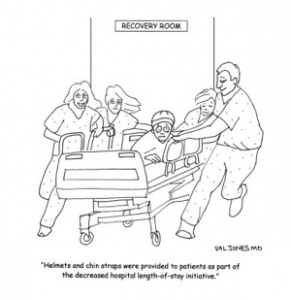When the president of a country dies suddenly, they say that the citizens forever remember where they were, and what they were doing, when they first heard the news. I’ve heard people discuss their personal circumstances when they received word that President Kennedy was shot. For some reason, that sort of news is a memory fixative, preserving individual experience along with national tragedy.
For me, 9/11 was one of those events. I was getting off a night shift rotation at a hospital in lower Manhattan, sitting in morning report, dozing off as usual – my eye lids sticking to dry corneas, my head feeling vaguely gummy, thoughts cluttered with worries about whether or not the incoming shift of residents would remember to perform all the tasks I’d listed for them at sign out.
And as I dozed off, suddenly our chief resident marched up to the front of the room, brushing aside the trembling intern who was presenting a case at the podium at the front of the dingy room. “How rude of him” I thought hazily, as I shifted in my seat to hear what he had to say.
“Guys, there’s been a big accident. An airplane just crashed into the World Trade Center.”
Of all the things he could have said, that was the last thing I was expecting. I shook my head, wondering if I was awake or asleep.
“We don’t know how many casualties to expect, but it could be hundreds. You need to get ready, and ALL of you report back to the ER in 30 minutes.”
I thought to myself, “surely some Cessna-flying fool fell asleep at the controls, and this is just an exaggeration.” But worried and exhausted, I went back to my hospital-subsidized studio apartment and turned on the TV as I searched for a fresh pair of scrubs. All the channels were showing the north tower on fire, and as I was listening to the news commentary and watching the flames, whammo, the second plane hit the south tower. I stared in disbelief as the “accident” turned into something intentional. I remembered having dinner at Windows on the World the week before. I knew what it must have looked like inside the buildings.
I was in shock as I hurried back to the hospital, trying to think of where we kept all our supplies, what sort of injuries I’d be seeing, if there was anything I could stuff in my pockets that could help…
I joined a gathering crowd of white coats at the hospital entrance. There was a nervous energy, without a particular plan. We thought maybe that ambulances filled with casualties were going to show up any second.
The chief told me, “Get everybody you can out of the hospital – anyone who’s well enough for discharge home needs to leave. Go prepare beds for the incoming.”
So I went back to my floor, recalling the patients who were lingering mostly because of social dispo issues, and I quickly explained the situation – that we needed their beds and that I was sorry but they had to leave. They were actually very understanding, made calls to friends and family, and packed their bags to go.
And hours passed without a single ambulance turning up with injuries. I could smell burning plastic in the air, and a cloud of soot was hanging over the buildings to the south of us. We eventually left the ER and sat down in the chairs surrounding a TV in the room where we had gathered for morning report. We watched the plane hit the Pentagon, the crash in Pennsylvania… I thought it was the beginning of World War 3.
The silence on the streets of New York was deafening. Huddling inside buildings, people were calling one another via cell phone to see if they were ok. My friend Cindy called me to say that she had received a call from her close friend who was working as a manager at Windows on the World. There was a big executive brunch scheduled that morning. Cindy used to be a manager there too… the woman’s last words were, “the ceiling has just collapsed, what’s the emergency evacuation route? I can’t see in here… please help…”
That night as I reported for my shift in the cardiac ICU, I was informed by the nursing staff that there were no patients to care for, the few that were there yesterday were either discharged or moved to the MICU. They were shutting down the CICU for the night. I wasn’t sure what to do… so I went back to my apartment and baked chocolate chip cookies and brought in a warm, gooey plate of them for the nurses. We ate them together quietly considering the craziness of our circumstance.
“Dr. Jones, you look like crap” one of them said to me affectionately. “Why don’t you go home and get some rest. We’ll page you if there’s an admission.”
So I went home, crawled into my bed with scrubs on, and slept through the entire night without a page. The disaster had only 2 outcomes – people were either dead, or alive and unharmed – with almost nothing in between. All we docs could do was mourn… or bake cookies.
 Thanks to Paul Levy, CEO of Beth Israel/Deaconess hospital in Boston, for hosting me at Running A Hospital. Here is an excerpt of my post:
Thanks to Paul Levy, CEO of Beth Israel/Deaconess hospital in Boston, for hosting me at Running A Hospital. Here is an excerpt of my post:










